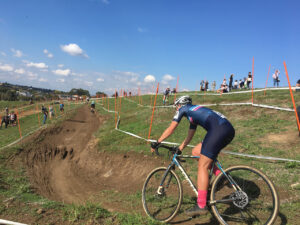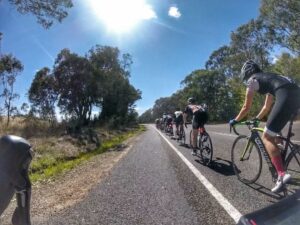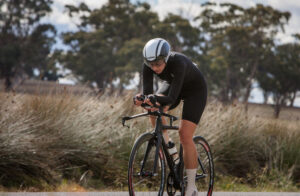This series of articles was inspired by a few conversations I had with women who are relatively new to racing as well as a conversation in SheRace; SheRace is a closed Facebook group dedicated to encouraging more women into racing.
My Story
So here’s a little picture of my cycling history. Like many I grew up riding a bike. Riding was fun, it was transport, it was a part of my first job. I stopped riding shortly after I got my driver’s licence, it seemed to be easier to drive and I could travel further distances. I returned to cycling when I was in my late twenties because I wanted to get fit and healthier. I began riding short distances, then further distances and then started riding with bunches. I was often dropped and was discouraged, but I kept going back and started staying with the bunch for longer, and eventually I was able to ride at the front of the bunch and got to the cafe at the same time as the guys.
Cycling is addictive… maybe it was the endorphins, the adrenaline, the camaraderie, the friends made, the cafe stops, or the weight loss. For me it was all of these; I started to feel good about myself and my mood was much improved. Cycling has become part of my life and part of my repertoire of self-care behaviours; cycling helps me be the best person and the best psychologist I can be.
 I was then tempted into racing and I’ve been racing now for about 13 years. I’ve raced on the track and on the road and have recently tried cyclocross. I enjoy criterium racing because of the fast pace, time trials because it’s just me and the clock and my personal best, road races for the challenge and cyclocross because it’s fun.
I was then tempted into racing and I’ve been racing now for about 13 years. I’ve raced on the track and on the road and have recently tried cyclocross. I enjoy criterium racing because of the fast pace, time trials because it’s just me and the clock and my personal best, road races for the challenge and cyclocross because it’s fun.
However, racing is hard work. I can’t remember the number of times I struggled, was dropped and finished solo and there have been a few times I’ve been told by officials I can’t finish or have decided to pull out because I was so far behind. I remember days where I felt horrible and didn’t want to ever race again. But I kept going back. I kept getting dropped, then I didn’t get dropped so much, then I finished closer and closer to front. Then I won a few races and it felt good. Then I was put in a higher grade and the cycle of getting dropped, riding and finishing solo, then getting closer and closer to the winner started again. It still happens, I still get dropped sometimes, and sometimes I don’t finish, but I always seem to line up at the next race.
As I became more competitive (actually, I’ve always been competitive, it just started to show more) and started to perform better, my head sometimes got the better of me… it was my head that was my weakness, not my strength or my breathing (I was given a diagnosis of asthma) or my skills, or my employment of strategies.
I know that there have been times when my fitness has let me down, but more often than not it has been where my head was at during training, or during an event that had the biggest impact on my results. I know I’ve talked myself out of a better performance climbing mountains or hills in a road race. I know I’ve talked myself into doing way too much work in a criterium or a road race because of how I was thinking about myself.
The Power of the Mind – The Psychology of Racing
 How I think about my performance and where I place my attention in the lead up to and during an event or race ultimately is the main factor that impacts on my performance and my enjoyment of the event. Racing can be really hard work… actually it’s mostly really hard work, but the mindset with which we enter a race, and the mindset we maintain throughout the race, has a significant effect on how we perform.
How I think about my performance and where I place my attention in the lead up to and during an event or race ultimately is the main factor that impacts on my performance and my enjoyment of the event. Racing can be really hard work… actually it’s mostly really hard work, but the mindset with which we enter a race, and the mindset we maintain throughout the race, has a significant effect on how we perform.
There a number of factors that can have an impact on how a race or event unfolds: those within our control and those that are outside of our control.
Factors outside our control:
-
- the weather – temperature, wind, rain
- the road conditions – smooth hot mix, dead road surface (rough), potholes, gravel, sand
- the terrain – flat, rolling hills, small punchy climbs, long climbs, descending
- other riders – their skills and their behaviour during a race
These factors are outside of your control and they can be managed by how you think about them. If you choose to race the Tour of Bright, for example, you know that you’ll be riding uphill a lot and road surface is likely to be dead, you can read the weather forecast, you can predict the likelihood of particular riders entering and guess at how they might perform, you can also read the start list, but you cannot change these factors.
Factors within our control:
-
- your own fitness & the training you’ve done in the lead-up
- your skills & the strategy you employ, if you use one
- your mindset – how you think about yourself and your ability and external factors
Taking control of event specific skills & strategies

If you decide to enter a time trial on your brand new time trial bike it might be wise to learn how to change gears, how to rest your arms comfortably on the aero bars, & how to pace your effort before you have to line up to start the race. These are skills that you can learn and generally we practice these skills in training to enable ourselves to do this as required.
You might also decide to use a training program to enable yourself to have the fitness & strength to be able to ride for 20-odd kilometres at a sustained pace. You might generally have some sort of strategy about how we’re going to approach those 20-odd kilometres, pacing is an important skill in time-trialling and how we chose to pace ourselves on a particular course is our strategy.
If you think you can’t, you won’t…
Our mindset is important in racing, in event participation, in work in social events…
-
- If we walk up to the start line thinking about how fast our competitors are or how ill-prepared we are and this has an impact on our physiological and cognitive responses…
- If we are about to do a presentation or attend a meeting and we are thinking about how others might be more qualified, or are perceived as more important, or more respected this has an impact on our physiological and cognitive responses…
….we feel our heart rate rise unnecessarily,
….our breathing might be a little too shallow,
….we might be shaking and struggle to clip in
….setting ourselves up steadily as we are held to start becomes difficult,
….we might struggle to focus our attention on the starter counting down,
….or we might be so focused on what’s going through our head that we struggle to focus on the task we are actually there to engage in…
…“I can’t do this”,
…“I’m not good enough”,
…“everyone is faster, smarter, more important, or more respected”,
…“I’m too slow”,
…“I’m a fraud”,
…“I’m going to miss a corner, word, or slide”,
…“I have to do a u-turn (or something else unfamiliar or difficult)…”
…“It’s windy and I’m going to be blown off my bike”,
…“they’re all going to pass me or leave me behind”, etc, etc, etc…
The next article will focus on what to do now…
I know what I’m thinking, I know it’s unhelpful, I still want to race and I want to race well, what do I do now?
If you would like to discuss the content of this article and how it applies to you, please feel free to make contact with me here or via my Facebook page @EnhanceLifePsychology
